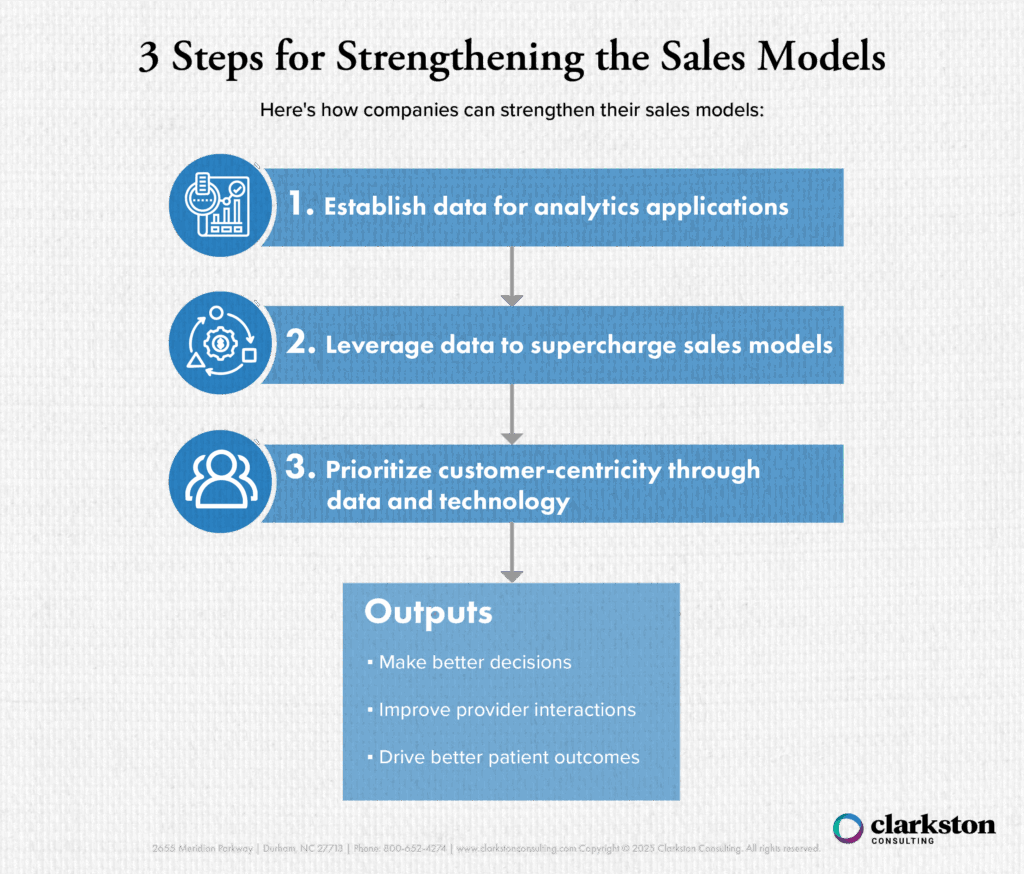3 Steps to Strengthen Sales Models in the Life Sciences with Data
In the life sciences industry, the sales function is vital for not only selling but also educating providers on life-changing products. Once upon a time, sales seemed straightforward: sales reps called on providers, and providers prescribed therapies to patients in need. However, the role of sales has evolved drastically in the last 15 years – first due to the Sunshine Act and again four years ago due to COVID-19. While both of those events shook up and challenged the life sciences industry, one major factor has been slowly influencing the sales process in a more positive way: the data boom. Thanks to the rise of data availability and data analysis, organizations can better distinguish how each interaction in the sales process creates impact. The use of data allows companies to better understand specific needs of providers and personalize their sales approach to each provider’s preferences based on results. With these new insights and information, companies can both better serve providers and improve sales. To strengthen sales models in the life sciences with data, there are three steps:

3 Steps to Strengthen Sales Models in the Life Sciences with Data
Let’s dive deeper into each step.
1. Establish data for analytics applications
The first step to improving sales is through establishing reliable data. Reliable data needs to come from both outside sources and from the sales organization itself. Third-party resources can supply market research data such as HCP and HCO data, competitive intelligence data, and market and industry trends. On the flip side, field sales reps need to provide accurate records of sales calls, whether they be in-person or digital, to better inform call analysis.
The idea of having clean and organized data seems simple but can be a challenge for companies just starting out or going through major reorganizations. When purchasing third-party data, companies should establish specific objectives prior to purchasing mass amounts of data. Having these objectives as the guiding principles keeps a company focused on only obtaining necessary data so they can avoid being overwhelmed with information. Key pieces of data include market size and segmentation, claims data, testing data, and competitive landscape.
On the internal data side, a major challenge can be motivating sales reps to keep accurate records of sales calls. Oftentimes reps are more focused on connecting with providers and hitting sales targets than keeping detailed records of calls. Companies can incorporate detailed record keeping as a KPI for sales compensation and ensure reps understand that record keeping is critical for compliant operations. Another way to ensure reps are adding detail to their call records is by showing them how reliable data can help them better understand and serve their providers. This starts by sharing meaningful data insights with reps that can easily be implemented into their sales approaches.
2. Leverage data to supercharge your sales model
Once processes are established to collect reliable data, companies can better leverage data to work in their favor. For example, data can show companies which areas, whether that be locations or disease states, require the most attention and resources. On the provider level, companies can better discern cause and effect of rep interactions, gauge whether in-person or remote engagement is more impactful, and measure how frequent providers need interaction with sales reps to keep products top of mind. This approach can be complimented by developing nonpersonal promotion such as email marketing campaigns.
In 2023, Veeva, a cloud-computing company specializing in applications for the pharmaceutical and life sciences industries, discovered that digital materials were responsible for two and a half times increase in new patients starts with only several key marketing pieces being used. Digital materials not only include email templates and remote engagement platforms, but also digital sales aids that reps can use in office. This insight came from analyzing rep and physician interactions. If reps can see patterns and insights like this from their own interactions in an easy-to-use interface, they are more likely to adjust their sales approach for positive results.
One major trend that is also transforming the data space is artificial intelligence (AI). A benefit of utilizing data in the age of AI for midsize companies is that it can level the playing field between large organizations and companies who may not have as many resources. The highest quality AI is very similar and available to midsized companies in the same way it is available to larger companies, and enterprise licenses are often on a per user basis. Large language models (LLMs) can process and clean up publicly available data that is often messy or unstructured, rather than relying on expensive, pre-cleaned datasets purchased from specialized vendors.
3. Prioritize customer centricity through data and technology
While customer-centricity isn’t a new concept in life sciences sales, the need to help providers better serve their patients has become increasingly more important. Medicine is now more complex and more diverse, meaning many patients need unique solutions that providers must manage.
One way to maintain customer-centric positioning is to provide on-demand resources for providers. Data and technology are making it easier for providers to have 24/7 access to information through online tools. Tools like AI chatbots and apps on mobile devices provide fast and reliable ways for HCPs to get information when they need it. Reps can be a vital resource for sharing these tools with providers to give supplemental support outside of normal business hours. Use of the tools and their impact should also be analyzed with insights feeding back into the sales model.
Next Steps
By establishing strong data for analytics, effectively applying data to supercharge sales models and utilizing data to maintain a customer-centric approach, companies can strengthen their sales approach. Clarkston offers support across Life Sciences Commercial (Sales & Marketing) services. For help applying data to your sales model, reach out to Clarkston today.



